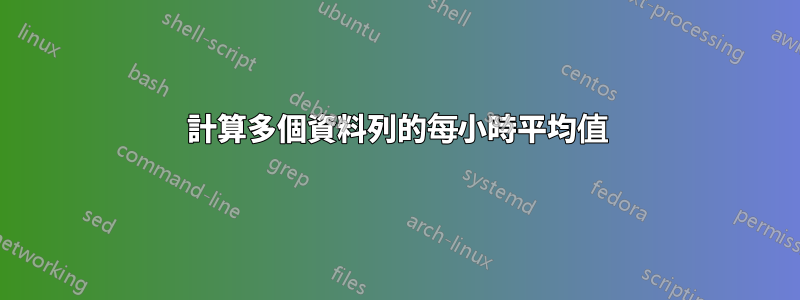
美好的一天,我想計算以下範例資料的每小時平均值:
Timestamp,data1,data2
2018 07 16 13:00:00,23,451
2018 07 16 13:10:00,26,452
2018 07 16 13:20:00,24,453
2018 07 16 13:30:00,23,454
2018 07 16 13:50:00,28,455
2018 07 16 14:20:00,20,456
2018 07 16 14:40:00,12,457
2018 07 16 14:50:00,22,458
2018 07 16 15:10:00,234,459
2018 07 16 17:50:00,23,845
2018 07 16 18:10:00,239,453
2018 07 17 10:10:00,29,452
2018 07 18 13:20:00,49,451
2018 07 19 13:30:00,28,456
期望的輸出:
Date,Hour,Ave_data1,Ave_data2
2018 07 16,13,24.8,453
2018 07 16,14,18,457
2018 07 16,15,234,459
2018 07 16,17,23,845
2018 07 16,18,239,453
2018 07 17,10,29,452
2018 07 18,13,49,451
2018 07 19,13,28,456
請注意,資料會持續數天(100000+ 筆記錄),資料列會有所不同,有時會有超過 2 個欄位(即 data1、data2、...、dataX)。所以我希望即使有更多列,腳本也能夠進行計算。我們將非常感謝您的幫助。
PS:在發布此內容之前,我檢查了舊帖子,它們並沒有真正解決我的問題。
答案1
#!/usr/bin/perl
use strict;
my $prev = '';
my (@sums,@avg) = ();
my $count = 0;
while(<>) {
chomp;
if (m/^Timestamp/) {
my @headers = split /,/;
# insert "Ave_" at start of each header
@headers = map { "Ave_" . $_ } @headers;
# replace Timestamp header with Date,Hour headers.
splice @headers,0,1,qw(Date Hour);
print join(",",@headers), "\n";
next;
};
my (@data) = split /,/;
# extract and remove date and hour from first element of @data
(my $current = shift @data) =~ s/^(.*) (\d\d):.*$/$1,$2/;
if ($count == 0 || $current eq $prev) {
# add each field in @data to the same field in @sums
foreach my $i (0..$#data) { $sums[$i] += $data[$i] };
$prev = $current;
$count++;
next unless eof;
};
# calculate and print the averages for the previous hour
foreach my $i (0..$#sums) { $avg[$i] = $sums[$i] / $count };
print join(",", $prev, @avg), "\n";
# special case handling for when there's a new date/hour on the
# last line of file (otherwise it wouldn't get printed)
if (eof && $prev ne $current) {
print join(",", $current, @data), "\n";
};
@sums = @data;
@avg = ();
$prev = $current;
$count = 1;
};
這應該適用於任意數量的資料欄位。
另存為,例如,average.pl使其可執行chmod +x average.pl並運行如下:
$ ./average.pl input.csv
Date,Hour,Ave_data1,Ave_data2
2018 07 16,13,24.8,453
2018 07 16,14,18,457
2018 07 16,15,234,459
2018 07 16,17,23,845
2018 07 16,18,239,453
2018 07 17,10,29,452
2018 07 18,13,49,451
2018 07 19,13,28,456
map關於 perl 以及循環和迭代器的額外有趣的(IMO)內容:
僅供參考,foreach my $i ...可以重寫循環以使用 perl 的map函數(請參閱perldoc -f map,但簡而言之:map迭代列表,對每個元素執行操作,並返回新生成的列表或該生成列表中元素的計數) 。這是更慣用的 Perl 語言,但對於新的 Perl 程式設計師來說可能更難理解。例如
foreach my $i (0..$#data) { $sums[$i] += $data[$i] };
could be written as:
@sums = map { $sums[$_] + $data[$_] } 0..$#data;
這兩個都迭代指數@data 數組 ( 0..$#data) 的。 for 迴圈直接建立/修改 @sums 的元素,而map傳回一個新的 sum 數組,然後將其指派給 @sums 陣列。
該函數不使用$i迭代器變量,而是map自動建立並使用名為 的(本地化)標量變數$_。 $_在 perl 中隨處使用,並且在未提供參數時是大多數函數的隱式(即預設)參數。例如,print沒有參數實際上是print $_,並且split /,/實際上是split /,/, $_。它對於模式比對運算子也是隱式的,例如s/foo/baris 實際上$_ =~ s/foo/bar/。
類似地,while (<>)實際上是類似的while (defined($_ = <>))(即從輸入檔案或標準輸入中讀取一行,如果有任何內容要讀取,則將其分配給 $_ 並評估為 true。否則評估為 false 並結束循環while)。
$_通常被非正式地稱為“當前事物”或“事物”。查看man perlvar並蒐索\$_更多詳細資訊。還有一個等效的數組@_,用於傳遞給子例程的參數。
foreach my $i (0..$#sums) { $avg[$i] = $sums[$i] / $count };
could be written as:
@avg = map { $_ / $count } @sums;
在這裡,foreach循環迭代指數@sums ( 0..$#sums),而map迭代價值觀數組的@sums。同樣,foreach循環直接修改數組的每個元素@avg,同時map傳回一個分配給 的新數組@avg。
兩種形式在此腳本中產生相同的輸出,並且兩種形式都很有用,但是 Perl 程式設計師傾向於map隨著時間的推移使用它,因為它是迭代任何類型列表的通用工具。與執行相同操作的 for/foreach 迴圈相比,鍵入時間更短。因為,過了一段時間,用列表、陣列和雜湊來思考資料就會變得很自然。
它通常用於將數組轉換為哈希(或將哈希的值或鍵轉換為數組)。
順便說一句,map不必返回數組,其中的程式碼區塊{ ... }可以執行 perl 程式碼可以執行的任何操作,並且返回值可以被丟棄或(如果分配給標量變數)返回任何生成列表的計數。
例如,第一個 foreach 迴圈也可以寫成:
map { $sums[$_] += $data[$_] } 0..$#data;
這會直接修改@sums數組(就像foreach循環一樣),並且任何傳回值都會被丟棄(即不分配給任何變數)。
當然,第二個foreach循環也可以寫成:
map { $avg[$_] = $sums[$_] / $count } 0..$#sums;
答案2
離開GNU awk:
#!/usr/bin/awk -f
BEGIN {
FS=OFS=","
}
NR == 1 {
# Build the header here
for (i = 2; i <= NF; i++) oh = oh OFS "Ave_" $i
print "Date", "Hour" oh
next
}
{
# Split date and time and build a timestamp with it.
# Set MM and SS to 0 to aggregate data from the same hour
split($1, a, " ")
sub(/:.*/, "", a[4])
ct = mktime(a[1] " " a[2] " " a[3] " " a[4] " 00 00")
# If the 'current time' differ from the 'old time' then
# do the average and print the line
if (ct != ot && ot) {
for (i in avg){
avg_h = avg_h OFS (avg[i] / cnt[i])
delete avg[i]
delete cnt[i]
}
sub(/^,/, "", avg_h)
print cd, ch, avg_h
avg_h = ""
saved = 0
}
j = 0
for (i = 2; i <= NF; i++) {
avg[j] += $i
cnt[j++] += 1
}
# Do the assignment if and only something has changed
if (!saved) {
saved = 1
ot = ct
cd = a[1] " " a[2] " " a[3]
ch = a[4]
}
}
END {
# There are something else? Print it
for (i in avg)
avg_h = avg_h OFS (avg[i] / cnt[i])
sub(/^,/, "", avg_h)
print cd, ch, avg_h
}
運行為:./script.awk data


